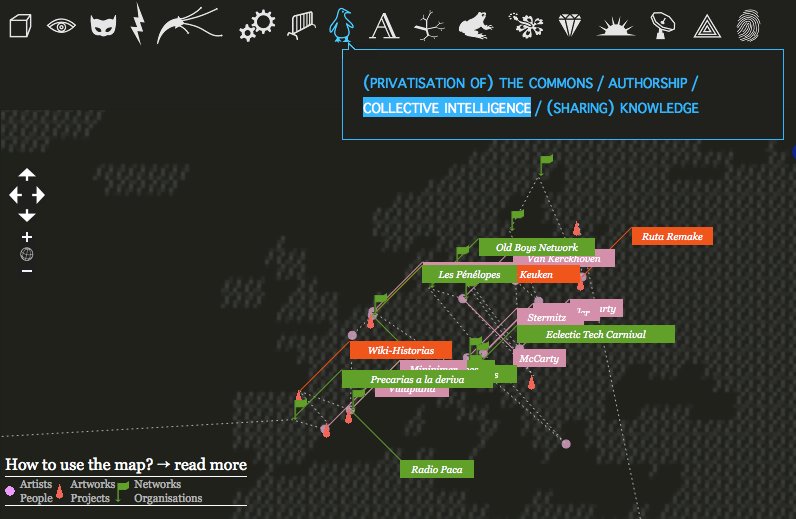With Bettina Knaup and Nicolas Malevé. European Cultural Foundation, Constant Association for Art and Media. Berlin 2008-2013.
About the project
GenderArtNet is an experimental mapping project exploring the interrelation of gender, ethnicity, race, class and sexualities in contemporary Europe. GenderArtNet’s primary aim is to thematically link the various existing online resources of feminist and queer artists, projects and networks rather than provide yet another user platform for artist profiles. By connecting existing, often remote, online resources, we would like to improve the accessibility and readability of these resources while keeping the memory of feminist artistic and cultural production in the broader Europe alive.
By organising this information in a map, we work to provide contexts, connections, and relations between artists, artworks and networks and between geopolitics and artistic practice. Our starting point is a relational understanding of feminism as a critical, multilayered practice that considers the interrelatedness of various forms of social, political and cultural hierarchies and exclusions along the lines of gender, sexuality, ethnicity, bodily ability, race, class and geopolitical location.
In addition to this thematic and relational approach, we stress the relevance of the geopolitical context for artistic and cultural production and strive to provide a different reading of the geopolitics of Europe through artistic practice. As Irit Rogoff states in Terra Infirma (2000), maps are signifiers of both, location, as well as identity, culture and politics. They are epistemological tools, which encode accumulated knowledge. Historically closely linked to the emergence of imperial empires and colonialism, they allow(ed) to naturalise political systems, borders, regimes and empires. The contemporary (artistic) practice of un-mapping, re-mapping, and counter-mapping attempts to decode these naturalised systems of knowledge, for instance by assigning unacknowledged histories and marginalised perspectives (such as dislocation, subjective memories, exclusion and cross-cultural experiences) to geographical terrain. In this sense, re-mapping also becomes a practice of cultural translation.
In order to better highlight this complexity, we have organised the map into a series of twelve thematic clusters, called galaxies, which contextualise resources while linking and relating artists, projects, networks, as well as artistic practice, and larger social and political issues to one another. These galaxies have been developed through a longer editorial process in which the participants’ personal experiences and subjectivity, their collective inspiration, coincidence, revolt, humour and irony took a strong place. The galaxies are represented on the website using comprehensive geographic information system tools. In order to avoid geographically mapping (new, exotic, other) territories for cultural consumption, we opted to use the astronomical model as a visual point of reference to map the galaxies as constantly shifting, alternative territories.
Workshops and presentations
Launch and presentation, uqbar, Berlin
Nolens Volens, Manifesta 8, Murcia.
Transeuropa Festival, Cluj-Napoca, Boloña.
Tagging Matters, Constant, Brussels
Cuerpo Impropio. Guía de modelos somatopolíticos y de sus posibles usos desviados, UNIA Arte y pensamiento, Universidad Internacional de Andalucía, Sevilla. Seminario dirigido por Beatriz Preciad.
(…) “Ciencia, territorio y narrativas subjetivas”, Centro de Producción de Artes Visuales Hangar, Centro de Arte Can Filipa, Barcelona. Curated by Lorenzo Sandoval.
Dissident Desire #0 Introducing daydreams of precarious bodies, District, Berlin. Curated by Susanne Husse and Lorenzo Sandoval.
Festival Feministaldia 2013, Donostia.
Related publications
(…) Ciencia, territorio y narrativas subjetivas. Gender Art Net, Claire L. Evans, Regina de Miguel, Paloma Polo and Teresa Solar. Exhibition catalogue. Edited by Broken Dimanche Press. Edition: 100.
Nolens Volens nº4, Mediascapes, Ed. Universidad Europea de Madrid, 2010.
Credits
Concept and development: Bettina Knaup in cooperation with the media art organisation Constant vzw, Brussels and Maria Ptqk.
Programming: Nicolas Malevé, Constant vzw.
Research and editorial collaboration: Line S. Karlström (artist), Bettina Knaup (independent curator, Berlin), Dunja Kukovec (independent curator, Ljubljana), City of Women (Ljubljana), Nicolas Malevé (data activist, Constant vzw, Brussels), Diana McCarty (Klubradio.de, Berlin), Urska Merc (independent producer, Amsterdam / Ljubljana), Maria Ptqk (independent curator, Bilbao / Berlin), Anne Quirynen (artist & professor of European Media Studies, Potsdam), Laurence Rassel (director, Antoni Tàpies Foundation), Femke Snelting (artist, designer, Constant vzw, Brussels & De Geuzen, Amsterdam), Katalin Timár (curator, Ludwig Museum of Contemporary Art, Budapest), Mara Traumane (independent curator), and the following students of the European Media Studies programme jointly offered by the University of Potsdam and University of Applied Sciences Potsdam: Lenore Hipper, Inés Matres, Sebastian Moering, and Laura-Helen Rüge.
Web and print design: Ludivine Loiseau, with Open Source Publishing, with Inkscape 0.47, Scribus 1.3.5.1 text in Linux Libertine, Nimbus, NotCourierSans
Statistics: Anne-Laure Buisson, with R, free software environment for statistical computing and graphics

